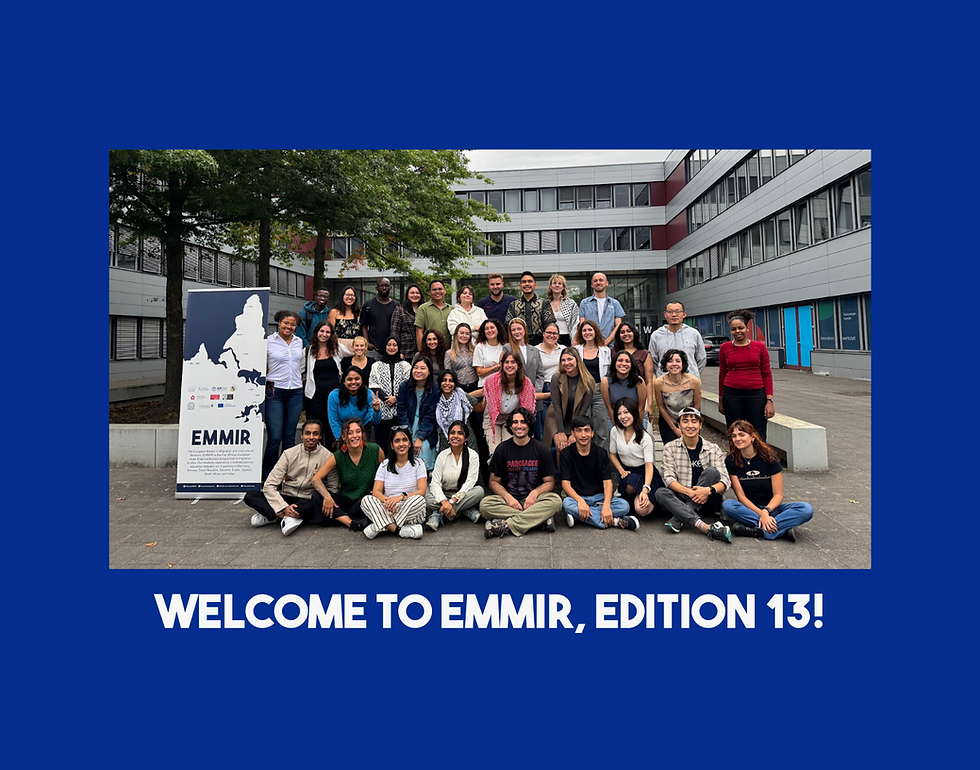C8 and C9 winners of the Most Innovative Thesis Award announced
- Nov 13, 2022
- 3 min read
Updated: May 24, 2023
The winners of the annual Most Innovative Thesis Award were announced for Cohort 8 and Cohort 9 at the Graduation Ceremony and Celebration in Oldenburg in October 2022. The award is presented to the author of an exceptional master’s thesis from each Cohort. The granting of this award is based on nominations from each student’s supervisors. The Most Innovative Thesis Award comes with a prize of €1,000.
A big congratulations to the winners: Fernanda Madrigal from Cohort 8, and Nikola Lero and Gabriela Yanez who will share the prize from Cohort 9.
Let's hear from the winners about their research and receiving this honour:
Fernanda Madrigal: "When the cure becomes the poison. Legal responses of the Inter-American and European protection regimes to the “mass influx” of forcibly displaced persons due to “humanitarian crises”: the cases of Venezuela and Syria."

During my internship with the Jesuit Refugee Service, I conducted field work in Quito, Ecuador. My work mainly consisted in offering legal advice to asylum seekers from Venezuela and Colombia. Later on, while in Europe I collected information regarding the Syrian case through literature review. Through documentaries, I collected stories and experiences of Syrian persons.
This thesis questions what is understood as "protection" and how this is translated into legal responses (or not) in cases of "humanitarian crises". The topic is approached through a human rights and post-colonial perspective, consisting of a comparative case study of the “mass influx” of Syrian and Venezuelan populations and their encounter with the European and Inter-American regimes of protection, respectively.
I put my heart and soul into this thesis for a year. Many things have changed since I wrote it; for instance, I became a Protection Officer and studied asylum applications as part of the Mexican government, but I can assure that the topic remains an urgent one.

Nikola Lero: “Poetry of Leaving: an Auto/Biographical Journey Through Decision-Making Rhizome of Contemporary Bosnia and Herzegovina (E)Migrations.”

My family and I have been migrants my entire life. I actually became a refugee during the 1990s war in Bosnia when I was only a three-month-old baby. Therefore, I wanted to write an auto/ethnographic and auto/biographic thesis titled "Poetry of Leaving", a story and testimony about that experience - of being perpetually in a "migrant state", being in and on the move. I analyzed my diaries and essays, my father's poetry book, and interviewed my mother and my sister.
However, I believe the biggest contribution of my thesis is hidden in its theoretical and methodological approach. I borrowed a philosophical approach by Deleuze and Guattari called Rhizome, which is not a migration studies theory. Well, not yet. Then, I combined auto/ethnography with poetic inquiry and wrote my analysis in the form of research-poems, incorporating methods from humanities in this case. So, the end product was an assemblage not often seen in our field and the award came as a result of that.
But, I would like to emphasize that I was never thinking about the award. Why? Because implementing new theories and methods can be risky endeavor and might not be recognized immediately. Yet, it should not stop us. On the contrary, I believe it should motivate us to explore new paths, new maps of learning and to see that we, although still students, are not just mere consumers of knowledge but also those who produce, who create it. Herein lies our responsibility to move the field forward: to explore ourselves and our social world in a new way.

Gabriela Yanez Atiencia: “The Complex Process of Becoming: Exploring Undocumented Migrant Activism in Barcelona.”

"The complex process of becoming: Exploring undocumented migrant activism in Barcelona" is an ethnographic case study that sought to get close to the lived experiences of undocumented migrant women in Spain. Through a combination of classical (participant observation, narrative interviews, focal groups, etc) and art-based research methods (art therapy sessions), I was able to understand better how undocumented migrant women negotiate between their personal narratives/experiences and the complexities of their political environment. Questioning the notion of activism, as well as juxtaposing the meaning of personal and private vs. discursive and public, I examine the process of "becoming an activist" as a multilayered negotiation of social dynamics that, although inherent to the validation of political subjects are also unavoidably emotional"
Winning one of the awards for the Most Innovative thesis was truly inspiring for me because, despite the difficulties in convening the complexity of my thesis fieldwork, I feel encouraged to continue exploring and innovating both theoretically and methodologically. Thanks to my thesis, I was able to reconnect with my identity as a migrant woman in Europe, and also to rediscover through empathy the lives and stories of the people who make up such a community. This award ignited my passion for art-based research methods, participatory research, and social justice advocacy while reminding me of my positionality and my accountability as a researcher.

Congratulations to the winners!



Comments